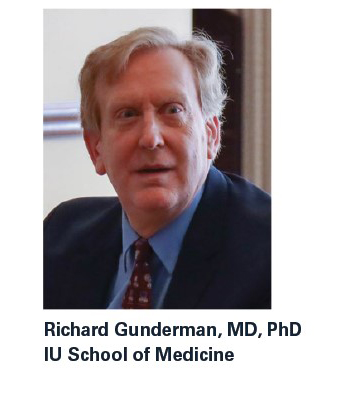 By Richard Gunderman, MD, PhD
By Richard Gunderman, MD, PhD
IU School of Medicine

It has been a decade and a half since my friend’s untimely death. A physician whose practice centered on the care of the very sick and dying, he had been fighting mental illness throughout much of his adult life. His travails finally ended in defeat, leaving in their wake countless grateful patients, admiring colleagues, and his own loving parents and children. Many eulogists praised his exceptional warmth and wisdom, yet like many colleagues, he also felt increasingly frustrated by what was happening in medicine.
Physicians make up only a tiny fraction of those living with mental illness, yet our struggles often ripple outward to affect many more patients and colleagues. One study found that resident physicians are more than three times as likely to be depressed as age-matched controls. Another suggested that 47% of depressed physicians are more irritable with staff, 35% are more likely to feel exasperated with patients, and 26% exhibit less care in taking notes.
Symptoms of depression may include low self-esteem, a sense of hopelessness or sadness, alterations in diet and sleep, restlessness, and thoughts of self-harm. Too often, our attention is drawn in so many different directions that we fail to notice such warning signs in colleagues and ourselves. Physicians experiencing such difficulties are often less likely to be open about them, fearing they will lose the respect of their colleagues, their privacy, and even their jobs.
The reasons that physicians face elevated risks for mental health conditions are sometimes centered on the individual. Like colleagues in other health professions, we face high work intensity and long hours, difficulties balancing the personal and professional domains of life, and in some cases, conflict and even violence at work. More specifically, we are also exposed on a regular basis to injury, disease, suffering, and death, which may take a disproportionate toll on those of an especially empathetic nature.
Yet systemic factors are also at work, and health care is changing in ways that only exacerbate the problem. Many physicians are experiencing declines in influence over work, peer collegiality and support, public respect, and the sense that we wield the resources necessary to counteract such trends. The sea change now taking place from physician ownership of medical practices to physician employment by corporations is only accentuating such trends.
The corporatization of medicine, with a resultant decline in professionalism, casts physicians more and more as units of production, cogs in a machine, or even obstacles to progress in health care. We feel that our intense course of education, long experience, and deep dedication to the needs of patients and communities are being supplanted by an administrative model that prizes financial metrics, executive compensation, and shareholder return over the needs of patients.